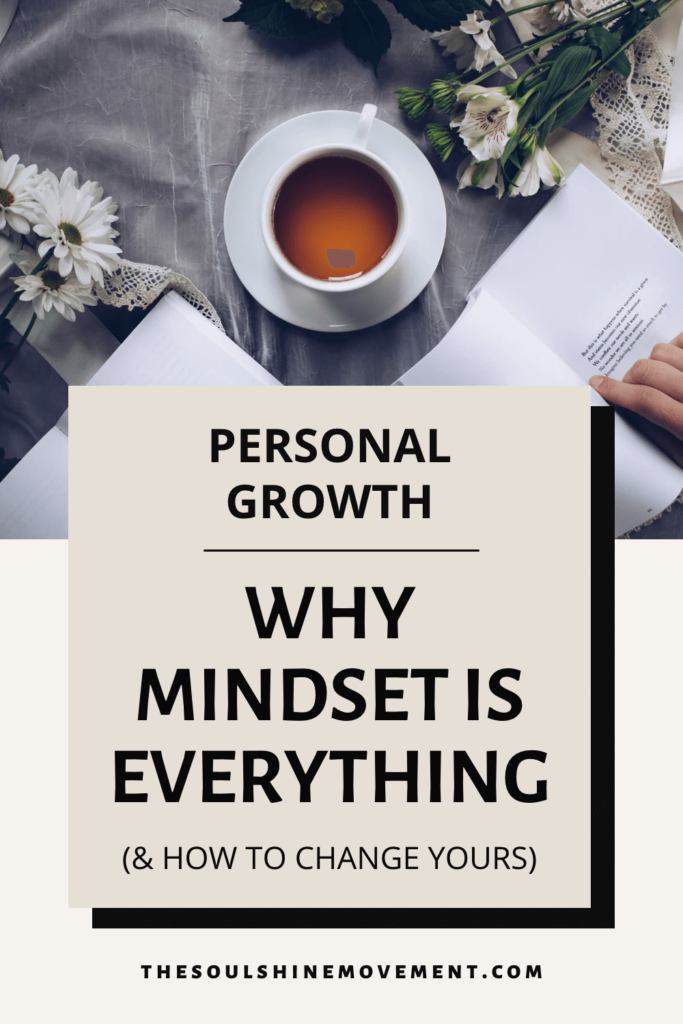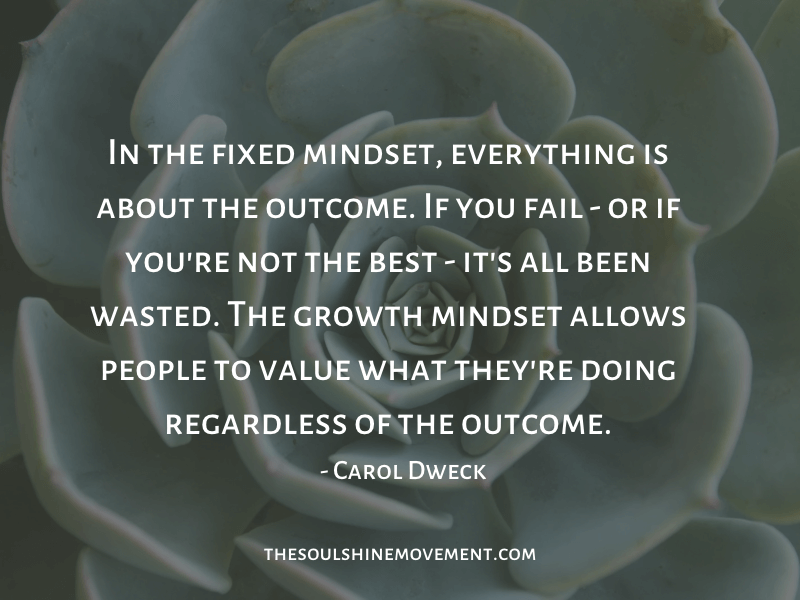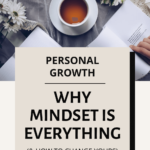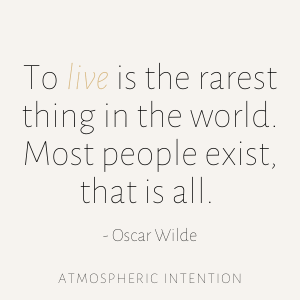When I first got started on my personal growth journey, I often felt overwhelmed. There were so many things I was interested in learning about and excited about improving in my life, but some of the areas I wanted to focus on seemed daunting or even impossible.
I felt like I wasn’t smart enough, talented enough, or didn’t have the right resources to accomplish the big dreams that were starting to develop in my mind.
In a lot of cases, it held me back from getting started with something I was passionate about. If you’ve ever experienced this, you know how frustrating and defeating it can feel.
I started reading and researching more about personal development, and I finally came across something that was life changing for me: fixed vs growth mindsets.

While it sounds SO obvious that anyone interested in personal growth would have a growth mindset, it’s a lot more complicated than that. If you think you have a growth mindset but haven’t done a deep dive into mindset research, read on.
The mindsets we have in life impact how we think, what we value, our relationships with others, and ultimately our successes and failures.
Research by Carol Dweck, an American psychologist and Stanford professor, has identified two clear and distinct mindsets: fixed and growth. Understanding the two mindsets and working towards developing a growth mindset can have unparalleled effects on all aspects of your life.
Fixed vs Growth Mindsets: What is a Fixed Mindset?
A fixed mindset is characterized by an innate belief that our intelligence, athleticism, success, character, and other such qualities are fixed in nature and cannot be changed.
People with fixed mindsets typically think that if they are not good at something, it is because they were born that way and don’t have the ability to change it.
People with fixed mindsets generally avoid difficult challenges out of fear of failure. They often give up on something at the first sign that they don’t have the talent, knowledge, or ability to accomplish it.
They don’t recognize that in most situations in life, we can cultivate the necessary skills or knowledge if we put in the effort.
Living in a fixed mindset often leads to negativity. People in this mindset are more likely to feel threatened by successful individuals and feel bad about themselves by comparison, believing that they aren’t (and will never be) good enough.
It can become a toxic and depressing cycle, which is why the research behind fixed and growth mindsets could prove to be invaluable in changing people’s lives.
Fixed Vs Growth Mindsets: What is a Growth Mindset?
Those with a growth mindset, on the other hand, understand that with enough practice, time, and effort, we can improve at almost anything. They thrive off of challenges, seeing them as an opportunity to learn something new, rather than a reflection of their own innate ability if they do not succeed.
Having the desire to improve and a willingness to learn from failure are keys to growth at almost anything in life. We build confidence through experience and overcoming challenges, and are much more likely to succeed if we are willing to put ourselves out there and try in the first place.
The growth mindset requires being open-minded, curious, and willing to push yourself outside of your comfort zone.
It means accepting that you may not understand something the first time, but if you’re determined to learn, you can keep working at it until you do.
It means being humbled by failing when trying a new skill, and continuing to put in the work until it is effortless for you.
We’re all capable of so much more than we think; and nine times out of ten, if you really want something and are willing to be vulnerable and work to get better at it, you will succeed.
Examples of Growth Mindset: How is it Effective?
Many people who are stuck in a fixed mindset or struggling with limiting beliefs might find the concept of the growth mindset to be unrealistic. They might not believe that simply looking at life through a different lens can transform what we are capable of achieving. Here are a few examples of why the growth mindset is truly effective:
Neuroplasticity and the Growth Mindset
Neuroplasticity: ever heard of it? I hadn’t until about a year ago. Neuroplasticity is your brain’s ability to modify or change through growth and reorganization. Our brain is composed of approximately 100 billion neurons, which are all interconnected.
New experiences, our environment, practice, and learning change the pathways between neurons, resulting in the ability to learn new things and more thoughtfully engage in every aspect of life.
This article on the psychology of neuroplasticity goes into much more detail than I will here if you’re interested in learning more!

There’s loads of scientific evidence out there that you as a human being are fully capable of rewiring your brain in ways that will help you learn more effectively, enhance your cognitive abilities, and reinvent yourself in ways you never thought possible.
If you find yourself thinking that you’re not smart enough, not motivated enough, or even just stuck in a rut of negativity, I’d encourage you to dive a little deeper into this topic.
When we put in the effort, we can actually change the way our brains work in a meaningful way.
The effects of neuroplasticity is clearly a win for the growth mindset, but it is also important to note that it can be detrimental for those in a fixed mindset.
If you are constantly stuck in negative thought patterns, surrounding yourself with cynical people, and feeling stressed by everyday situations, your neural connections and pathways around these topics will grow stronger. Our brain is wired around our default environment, so being mindful of the media we consume, the people we interact with, and our own choices is key.
The 10,000 Hour Rule
The 10,000 hour rule was popularized by Malcom Gladwell in his book Outliers. The basic concept here is that “practice makes perfect”, and you need to put in the time in order to see results in most things.
Gladwell uses examples such as Bill Gates putting in 10,000 hours of coding work before founding Microsoft and the Beatles putting in 10,000 hours of practice playing in Hamburg before becoming famous worldwide.
One quick caveat I’ll add here is that there are some flaws in this logic, the most notable to me being that it focuses on quantity over quality.
You can spend 10,000 hours of your life working on something, but if you’re not fully engaged and mindful of the quality of your effort, you are probably not going to become an expert.
Think of someone working out with incorrect form; they can put in as many hours as they want, but until they focus on correcting their poor form, they are more likely to get injured than to become stronger.
The underlying concept, however, is important. The more time and energy you put into something, the better your results will be.
If you try to shortcut your way to success, you’ll only end up hurting yourself in the long run.
Whether your goal is to learn a challenging concept, start a successful business, or get in peak physical shape, if you are dedicated to spending significant time working towards your goal (and ensuring you are putting in quality effort during that time), the results of your effort will compound.
Focus on becoming 1% better each day, and you’ll be amazed at the transformations that can take place over time.
Focus on the Process, Not the Results
Have you ever been so focused on the end result of something that you don’t care what it takes to get there, as long as you accomplish it?
In theory this mindset might be useful to cross the finish line on one goal, but it won’t benefit you long-term. Additionally, if you don’t succeed, you’ll feel as if you’ve wasted your time. One of my favorite quotes from Mindset by Carol Dweck frames this idea well:

Focusing on the process, rather than the end goal, allows you to build growth oriented habits that will stick with you for the rest of your life.
When you are only focused on the outcome of something, the process to get you there might be unsystematic, rushed, and unrepeatable in the future. James Clear focuses on the importance of systems in his book Atomic Habits, and makes an excellent point in the following quote:
“When you solve problems at the results level, you only solve them temporarily. In order to improve for good, you need to solve problems at the systems level. Fix the inputs and the outputs will fix themselves.”
– James Clear
When you approach things from a process level rather than a result level, you will:
- Be able to find happiness in the day to day work, rather than only allowing yourself to be happy when you’ve reached the goal
- Build lasting habits that will impact other areas of your life
- Find deeper understanding and value in the foundational work
- Be able to better articulate to others what has helped you become successful
If you’ve made it this far, hopefully I’ve managed to impart how important it is to embrace the growth mindset! Embracing it is only the start of the journey; fully embodying it is a lifelong effort.
Changing Your Mindset
When I first learned about fixed and growth mindsets, I had two burning questions:
- Can a person have a mix of fixed and growth mindsets?
- Can you change your mindset?
The answer to both is, simply, YES.
If you’ve been reading through this post and thinking “I think I have a growth mindset around some things in my life, but a fixed mindset about others”, this is no cause for alarm.
You can have a fixed mindset around your athletic ability while having a growth mindset towards intelligence. Dweck’s research has shown that we all have a combination of both mindsets, and typically are more heavily influenced by one or the other.
It’s important to recognize that while we absolutely can change our mindsets, it is not as simple as proclaiming that you have a growth mindset.
It is a long journey and takes a lot of dedication and determination. While everyone’s journey will look slightly different, here are a few key steps to getting started:
- Identify where your fixed mindset shows up and what you would like to change.
- Recognize that you are capable, scientifically, of growth (thanks to neuroplasticity!)
- Put yourself outside of your comfort zone.
- Be open to failure (and feedback). We learn more from our failures than we do our successes.
- Value the process, not the results.
- Keep going!
Most importantly, be gracious with yourself through the process. It can be a difficult thing to let go of certain beliefs and consequently a version of yourself that has gotten you to where you are today.
Understand that it may be an uncomfortable process – growth usually is!
Mindset & Intentions
How can you be more intentional about cultivating a growth mindset?
One key is to become more aware of what triggers your fixed mindset. Maybe it’s receiving negative feedback from your boss. Maybe it’s romantic rejection.
We’ve all got fixed mindsets around certain things, and once we start to recognize when they appear, we can be better prepared to react.
The more aware you are of what gives rise to your fixed mindset, the more intentional you can become about responding in growth-oriented ways.
Finally, be intentional about the steps you are taking to move closer to your goals. Ask yourself how each step will help you learn or grow, how it adds value, and what, if anything, could be improved. Be fluid with the process and open to change.
Our mindsets truly determine our course in life. Be curious, never stop learning, and never stop growing.











0 Comments